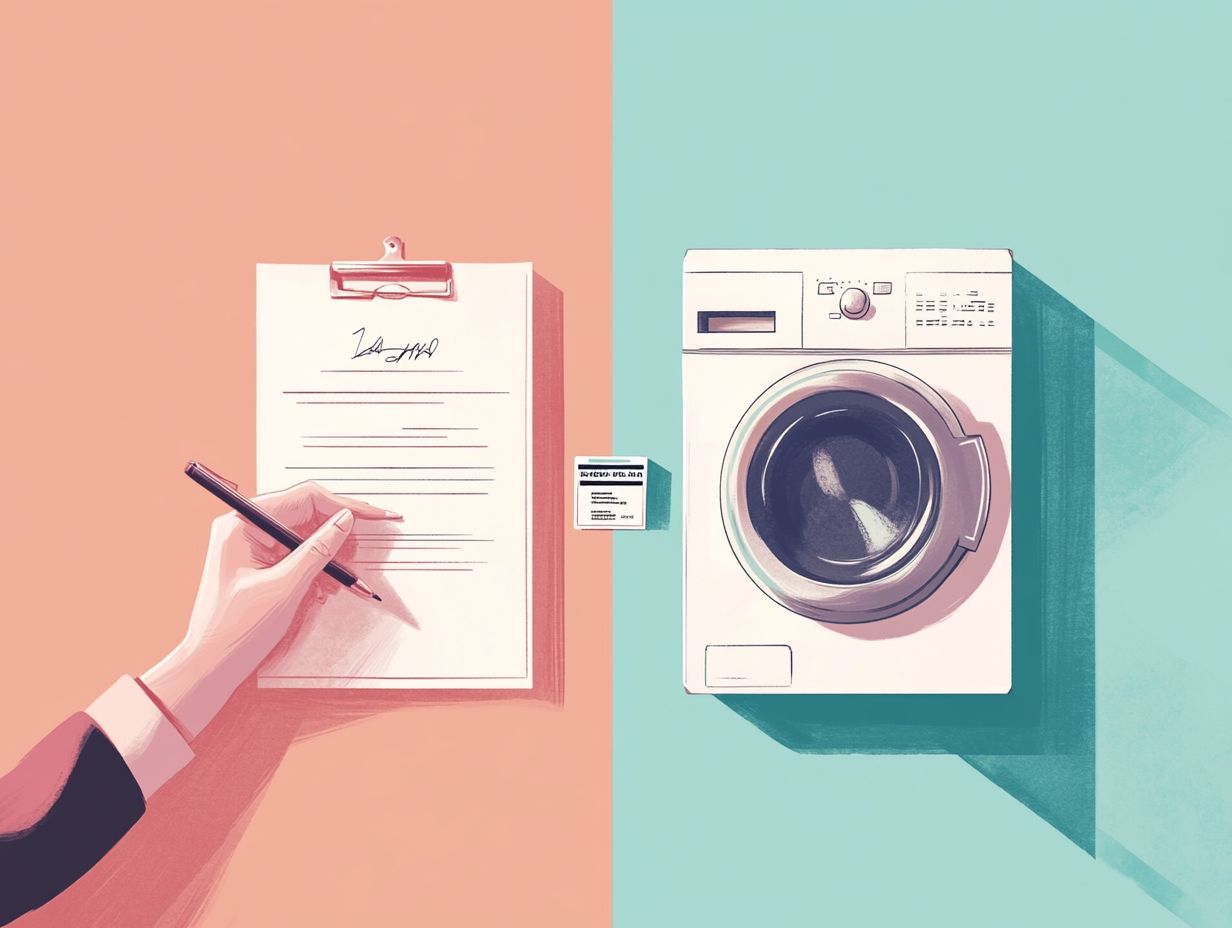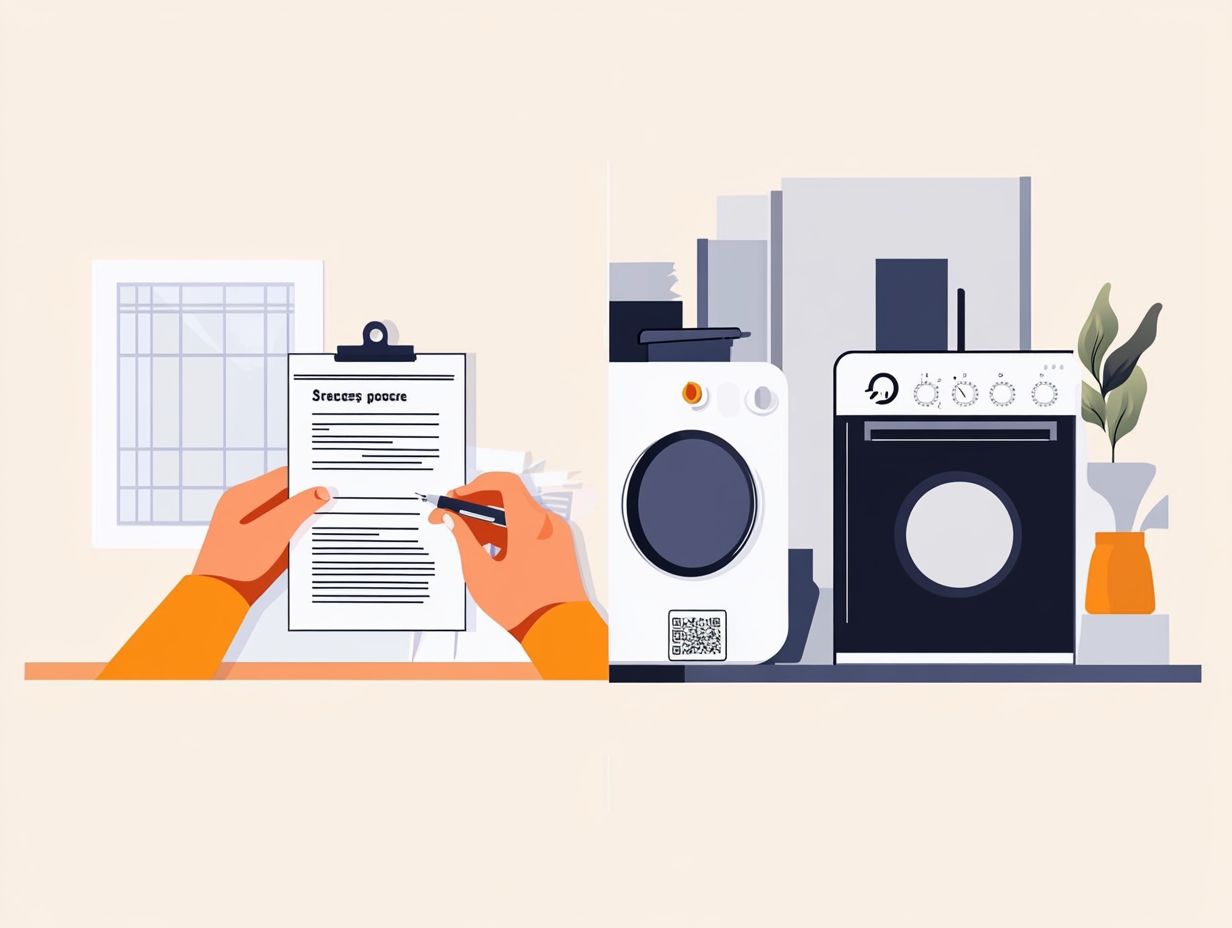The Relationship Between Insurance and Warranty
Navigating the realm of insurance and warranties can feel overwhelming, but grasping their unique roles is vital for protecting your investments.
This article demystifies key definitions and examines the benefits each provides, shedding light on their complementary relationship.
Explore the different types of coverage and the factors that influence your decisions, empowering you to make informed choices.
By the conclusion, you’ll gain a deeper appreciation for how insurance and warranties collaborate to enhance your peace of mind and safeguard what truly matters to you.
Contents
- Key Takeaways:
- Understanding Insurance and Warranty
- Benefits of Insurance and Warranty
- Types of Insurance and Warranty
- Factors to Consider When Choosing Insurance and Warranty
- How Insurance and Warranty Work Together
- Complementary Coverage and Limitations
- Frequently Asked Questions
- What is the relationship between insurance and warranty?
- Can insurance and warranty be used together?
- What is the difference between insurance and warranty?
- Do I need both insurance and warranty?
- What happens if I have insurance and a warranty for the same item?
- Can I cancel insurance or warranty at any time?
Key Takeaways:

- Insurance and warranties serve different purposes: insurance protects against unforeseen events, while warranties cover defects and malfunctions.
- The benefits of insurance and warranties include money protection and peace of mind, ensuring that unexpected expenses are covered.
- When choosing insurance and warranties, factors such as cost, coverage, and reputation should be carefully considered to find the best fit.
Understanding Insurance and Warranty
Understanding insurance and warranties is essential for anyone looking to protect their vehicle investments. These tools provide crucial safeguards against various risks that come with ownership, including car problems and unexpected accidents.
Car insurance and warranties each offer distinct types of coverage tailored to specific needs. Understanding the relationship between service intervals and warranty can help you navigate the services that manufacturers and warranty providers ensure for trustworthy vehicle repair and protective measures.
By grasping the nuances between these options, you can enable yourself to make informed decisions about your vehicle s protection plan.
Definitions and Differences
A car warranty is essentially a contract that guarantees the repair or replacement of parts in your vehicle due to defects or car problems, while car insurance provides you with money protection against accidents and damages.
Both are crucial for vehicle ownership, but their focus and coverage are quite distinct. A factory warranty is typically included with new cars and covers your vehicle for a specific period or mileage, allowing you to depend on the manufacturer for quality assurance.
On the other hand, an extended warranty, which is extra coverage you can buy after the original warranty ends, can be purchased for added years of coverage.
Car insurance offers a range of plans, including liability, collision, and comprehensive coverage, designed to protect you against theft and unexpected damages. By understanding these unique features, you can choose the right protection plan that aligns with your needs.
Benefits of Insurance and Warranty
Don t wait! The advantages of insurance and warranties are significant, providing you with peace of mind regarding your vehicle s upkeep and financial security in the event of accidents or breakdowns.
Car warranties cover you for any mechanical issues that may crop up after your purchase, while car insurance offers financial backing during unexpected incidents.
These protection plans cultivate confidence in your car ownership experience by alleviating potential costs and ensuring dependable support and service through your insurance providers. These plans act as your safety net, easing the worries associated with unexpected breakdowns or accidents that could lead to hefty repair bills.
Protection and Peace of Mind

Having a robust protection plan through car warranties and insurance allows you to drive with peace of mind, fully aware that your financial investment is safeguarded against potential risks.
When confronted with the uncertainty of mechanical failures or the aftermath of collisions, it’s normal to feel both emotionally and financially overwhelmed.
Protection plans not only cover repair costs but also instill a sense of security, enabling you to navigate the roads with confidence. Ultimately, these services are essential in creating a positive vehicle ownership experience, transforming any apprehension into a reassuring sense of certainty.
Review your insurance and warranty plans today to ensure you have the best coverage for your needs!
Types of Insurance and Warranty
Exploring the various types of insurance and warranty options reveals a rich tapestry of coverage tailored to meet your unique needs. From comprehensive insurance to liability coverage and even car warranty variations such as extended and factory warranties, each category is designed with specific protections in mind.
This plan covers mechanical breakdowns and accidents, giving you peace of mind on the road.
Exploring Different Coverage Options
When looking at coverage options, you can choose from several types of car insurance. Comprehensive insurance is an excellent choice as it covers various incidents, while liability insurance protects you against damages you may cause to others.
You might also consider collision insurance, which addresses damages to your vehicle after an accident. Uninsured motorist coverage offers crucial protection if you encounter drivers without insurance.
Don t overlook gap insurance, which is beneficial if you owe more on your vehicle than its current value. This option ensures you re financially protected during unfortunate events.
By knowing these options, you can tailor your policy to suit your needs, enhancing your peace of mind while driving.
Factors to Consider When Choosing Insurance and Warranty
When selecting the ideal insurance and warranty for your vehicle, consider several pivotal factors. Evaluate the average costs, the types of coverage available, and the reputation of the insurance providers.
Pay close attention to specific terms like deductibles the amount you pay out-of-pocket before insurance kicks in and coverage limits, as these can significantly impact your overall experience and protection.
Cost, Coverage, and Reputation

The cost of car insurance and warranties can vary based on factors like coverage limits, the deductible amount, and the reputation of the insurance providers.
These elements shape the financial commitment you face when securing your vehicle. For example, opting for a higher deductible may lower your monthly premiums, making it appealing if you re comfortable managing a larger out-of-pocket expense in the event of a claim.
Coverage limits define how much your policy will pay in case of an accident, greatly influencing your perception of its value. Choosing a provider known for excellent customer service and swift claims handling can inspire greater confidence in your decision.
By grasping how each factor interacts within the insurance landscape, you can make more informed and strategic choices.
How Insurance and Warranty Work Together
Understanding the interplay between insurance and warranties is crucial for maximizing your vehicle’s protection.
Car insurance provides financial coverage for accidents and liabilities, while car warranties ensure that mechanical breakdowns and maintenance issues are handled without unexpected costs.
By understanding how these two work together, you can safeguard your investment and drive with confidence.
Explore your insurance options or contact a provider for more information!
Complementary Coverage and Limitations
Complementary coverage between your car warranty and car insurance can offer a valuable safety net. However, it’s crucial to understand the limitations that might affect your claims and coverage.
When you leverage both forms of protection together, they create a formidable financial shield against unexpected vehicle repair and damage costs. Car warranties typically cover mechanical failures and breakdowns, ensuring that vital components remain functional without hefty repair bills.
In contrast, car insurance protects you against accidents, theft, and liability, covering the expenses that arise from unfortunate incidents on the road.
It s essential to stay vigilant about potential exclusions that could affect your coverage. For example, issues that were already present before your warranty began may not be covered, along with specific deductibles that apply to your insurance claims. These factors could significantly influence your overall expenses.
By understanding how these services interact, you ll be ready to tackle any repair challenges with confidence!
Frequently Asked Questions
What is the relationship between insurance and warranty?

Insurance and warranty both provide protection for unexpected events. However, they differ in terms of the types of coverage and the events that they cover.
Can insurance and warranty be used together?
Yes, insurance and warranty can be used together for better protection. For example, you can have a product covered by both a warranty and insurance for added security.
What is the difference between insurance and warranty?
The main difference is that insurance covers potential risks and losses, while warranty covers defects and malfunctions. Insurance typically involves paying a premium, whereas a warranty is often included in the purchase price of a product.
Do I need both insurance and warranty?
It depends on your specific needs and the type of coverage you are looking for. If you want protection for unexpected events, such as accidents or natural disasters, insurance is necessary. A warranty may suffice for coverage against defects or malfunctions.
What happens if I have insurance and a warranty for the same item?
If you have both insurance and warranty for the same item, it s important to understand the terms and coverage of each. If an event occurs, you may need to file claims with both to maximize your coverage and minimize out-of-pocket expenses.
Can I cancel insurance or warranty at any time?
It depends on the terms and conditions of your insurance and warranty agreements. Some may allow cancellation at any time, while others may have fees or restrictions. It’s best to review your agreements or speak with your providers for more information.
Explore your coverage options today to protect your investment!





